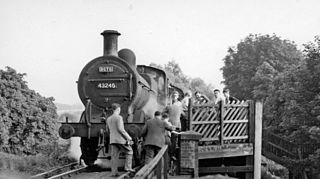
The Nickey line is a disused railway that once linked the towns of Hemel Hempstead and, initially, Luton but later Harpenden via Redbourn, in Hertfordshire, England. The course of most of the railway has been redeveloped as a cycle and walking path, and is part of the Oxford to Welwyn Garden City route of the National Cycle Network. It is approximately nine miles (14 km) long.

St Albans Abbey is one of two railway stations in St Albans, Hertfordshire, England; the other being the much larger and busier St Albans City. It is located about 0.6 miles (1 km) south of the city centre, in the St Stephen's area. It is the terminus of the Abbey Line from Watford Junction, with services operated by London Northwestern Railway.

Leighton Buzzard railway station serves the towns of Leighton Buzzard and Linslade in the county of Bedfordshire and nearby areas of Buckinghamshire. Actually situated in Linslade, the station is 40 miles (64 km) north west of London Euston and is served by London Northwestern Railway services on the West Coast Main Line. Until the 1960s the station was the start of a branch to Dunstable and Luton, with a junction just north of the present station. The station has four platforms. Platforms 1 & 2 serve the fast lines and are used by Avanti West Coast services running non-stop to/from London Euston. Platforms 3 & 4 are served by slower London Northwestern railway services to/from London Euston.

Welwyn Garden City railway station serves the town of Welwyn Garden City in Hertfordshire, England. It is 20 miles 25 chains from London King's Cross on the East Coast Main Line. Train services are currently provided by Thameslink and Great Northern.
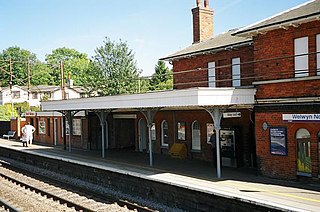
Welwyn North railway station serves the villages of Digswell and Welwyn in Hertfordshire, England. The station is located 22 miles (35 km) north of London King's Cross, on the East Coast Main Line. Train services are currently provided by Great Northern.

Dunstable Town, also known as Dunstable Church Street, was a railway station on the Great Northern Railway's branch line from Welwyn which served Dunstable in Bedfordshire from 1858 to 1965. Against a background of falling passenger numbers and declining freight returns, the station closed to passengers in 1965 and to goods in 1964, a casualty of the Beeching Axe. The station site is now in use as part of the Luton to Dunstable Busway.

Luton Bute Street railway station was the first to be built in Luton, England. It was opened by the Luton, Dunstable and Welwyn Junction Railway Company in 1858, which was an extension of the Welwyn and Hertford Railway. The track to Welwyn was completed in 1860 and taken over by the Great Northern the following year.

The Alban Way is a shared-use path along the former Hatfield and St Albans Railway in Hertfordshire, England. The route is 6.3 miles (10.1 km) long and is owned by St Albans City & District Council and Welwyn Hatfield Borough Council, within their respective boundaries.

Luton Hoo railway station was built by the Hertford, Luton and Dunstable Railway on the branch line between Hatfield and Dunstable. It opened in 1860 and was originally called New Mill End. In 1861 the station and line was taken over by the Great Northern Railway. The Prince of Wales, the future George V, who had travelled by special train from King's Cross alighted at the station on 5 December 1878 on a visit to Luton Hoo. A crowd cheered the Prince on his arrival. A carpet was laid along the station platform over which a wooden roof decorated with evergreens and scarlet cloth was erected. The station's name was changed to Luton Hoo in 1891. It was closed in 1965. The last passenger train, packed with enthusiasts, was hauled by Brush Type 2 D5589 on 24 April 1965.

The Dunstable Branch Lines were railway branch lines that joined the English town of Dunstable to the main lines at Leighton Buzzard and Welwyn. The two lines were under separate ownership and joined just east of the Dunstable North station.
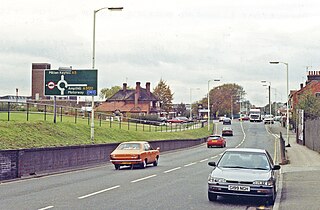
Dunstable North was a railway station on the London and North Western Railway's branch line from Leighton Buzzard which served Dunstable in Bedfordshire from 1848 to 1967. Originally the terminus of the London and North Western Railway's branch line from Leighton Buzzard, Dunstable became the point where the line met with the Great Northern's branch line from Luton in 1858. The station became the hub of a number of sidings connecting a variety of concerns to the line, including Waterlows, Bedfordshire County Council, Associated Portland Cement, Dunstable gasworks and a coal yard operated by the Great Northern. Against a background of falling passenger numbers and declining freight returns, the station closed to passengers in 1965 and to goods in 1967. Connections were retained with the cement works and coal yard, which became an oil depot, until 1988 and the line eventually closed in 1991. The site of the station is now occupied by offices of Central Bedfordshire Council. A section of the former line to the west of the site has become part of route 6 of the National Cycle Network.

Hertingfordbury is a small village in Hertfordshire, England, close to the county town of Hertford. It was mentioned in the Domesday Book of 1086. Hertingfordbury is also the name of a neighbouring civil parish, which does not contain the village. Hertingfordbury village is within the Castle ward of Hertford Town Council. The population of the civil parish as of the 2021 census was 689.

The Ayot Greenway is a rail trail which extends from Ayot St Peter, just west of Welwyn Garden City and the A1(M) Motorway to Wheathampstead in Hertfordshire. Part of National Cycle Network Route 57, it runs for three miles along a former branch line from Welwyn Garden City railway station towards Luton and Dunstable.

The Hatfield & St Albans Railway was a branch of the Great Northern Railway which connected St Albans to Hatfield in Hertfordshire, England. It opened in 1865 with the principal aim of allowing St Albans traffic to access the Great Northern's main line to London at Hatfield, but soon came into difficulties when the Midland Railway inaugurated a direct route to London through St Albans. Passenger receipts declined in the 1930s, resulting in the temporary withdrawal of services in 1939. Passenger services were permanently withdrawn in 1951, leaving goods traffic to linger on until December 1968. Much of the route of the line is now incorporated into the Alban Way, a footpath and cycleway.
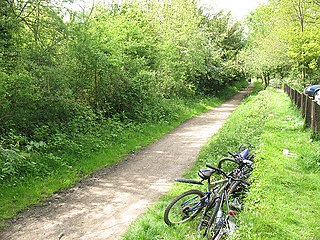
The Cole Green Way is a rail trail which runs east-west from the eastern edge of Welwyn Garden City to Hertford in Hertfordshire. Part of National Cycle Network Route 61, and the Lea Valley Walk, it runs for more than six miles along the former Hertford, Luton & Dunstable branch line from Welwyn Garden City railway station to Hertford North railway station.

Chaul End was a temporary railway halt on the Great Northern Railway's branch line from Welwyn which served a munitions factory near Luton during the First World War. The station site has been reused as part of the Luton to Dunstable Busway.

Hemel Hempsted station was a railway station in the town of Hemel Hempstead in Hertfordshire, England. UK. It was opened in 1877 by the Midland Railway and was originally the terminus of the Nickey Line, a now-defunct branch line which provided railway services to Chiltern Green and Luton and later to Harpenden.

Cole Green railway station was a station at Cole Green, Hertfordshire, England, on the Hertford and Welwyn Junction Railway. It was a passenger station from 1858 until 18 June 1951, also serving the hamlet of Letty Green.
The Hertford, Luton and Dunstable Railway was a railway affiliated to the Great Northern Railway. It was formed when the Hertford and Welwyn Junction Railway merged with the Luton, Dunstable and Welwyn Junction Railway, partly opened in the same year. The merger and change of title took place in 1860. The line joined the Dunstable branch of the London and North Western Railway at Dunstable.
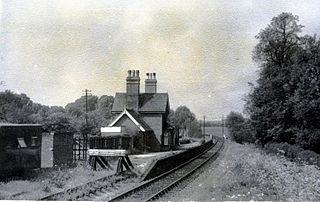
Hertingfordbury railway station was a station at Hertingfordbury, Hertfordshire, England, on the Hertford and Welwyn Junction Railway. It was a passenger station from December 1858 until 18 June 1951. It had a single platform and a small goods yard to the east. The line was finally closed to all traffic in 1962.


















